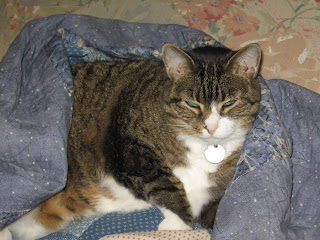I see in the news that
polygamist sect leader Warren Jeffs has been sentenced as an accomplice to the rape of a 14-year-old girl, which reminds me of a long-winded piece I wrote but didn't post. Lucky you!
I’m much too cheap for cable. My rationale is that PBS is essentially cable on a really small, time-segmented scale. So the way I watch any cable series is usually way later than everyone else when I get it via Netflix or through loans from other people.
Which brings me to what I’m currently plowing through:
Big Love (note to self: put season 2 in the queue). You say you had this discussion a year ago, or whenever the show came out? Sorry, I unilaterally declare it current and topical.
For those who don’t know, which I suspect is no one, the show depicts a family in Utah, living clandestinely, because they consist of a man with his three wives (and their various children). I confess that I’m sucked into this show, although it makes me uncomfortable that I’m sucked in and that I’m cheering for the characters. This is quickly followed by a feeling that I’m playing a willing cog in normalizing a broader narrative, similar to how
anti-choice groups are now broadening their focus to a soothing and unalarming opposition to birth control. I know, I’m overthinking. Does watching the
Sopranos mean that people are suddenly going to decide that maybe they’ve misjudged organized crime? Of course not. And I’m against censoring of any artistic work.
Let me state that as a principle, I don’t judge how consenting people want to set up their families. Polyamory (it’s pretty telling that the spellcheck on my word processor doesn’t recognize that as a word) is not necessarily a bad thing--I know of people who make it work for them. But you have to consider history and current context because people don’t act in a vacuum, without societal pressures, disincentives, or power asymmetries.
The history of polygamy in the United States isn’t discussed much because the LDS, frankly, don’t want to remind people of this chapter of their history (for a history and overview of Mormonism and the origins of Mormon fundamentalism and its controversial practices, I highly recommend
this book). Current practitioners of polygamy, e.g., fundamentalist Mormon sects, are shunned by the mainline church, and for good PR reasons. The combination of certainty of divine direction, power struggles over who is to be arbiters of that divine direction, the view of women as commodities to be acquired, traded, and bestowed upon men (often when they are young teenagers), and the resultant gender imbalances, which mean that young boys often are driven out of the community to reduce competition for wives, all make for very dysfunctional and unjust societies, particularly for the women. In contrast,
Big Love presents a loving, egalitarian view of polygamy (although, to its credit, it also presents the dark side, as represented by the complex and isolated community of the Compound).
Tied into that history of polygamy, of course, is the continuing disparity of power between men and women in this country. Much has changed, of course, since the 1970s, but, still, women are, for example,
predominantly carrying the load of childrearing and housework, still
making less money than men, and still
perceived as less capable than men in professional settings in virtually every metric, across cultures.
Given this reality, polygamy default sets women up in an unequal dynamic. The show tries hard to underscore that these individuals are all married to each other, but unless the women are sleeping with each other, that really isn't so. I think the extremist sects are the norm rather than the exception on how it's practiced in the real world. And to have people, for example, see polygamists on
Oprah and think, hmmm, people like us, maybe we're unfairly judging it, seems like a bit of cultural backsliding.
Okay, now the family is spared this at Thanksgiving, during which we can move on to talking about what happens next to Bill et al. (Don’t you love Barb? Aren’t the older kids just fabulously perfect, and doesn't that creep you out?)
.jpg)









 "This kid looks like he's pretending to be David Soul, who is pretending to be a cop who is pretending to be a pimp that everyone knows is really an undercover cop. Who is pretending to be 15."
"This kid looks like he's pretending to be David Soul, who is pretending to be a cop who is pretending to be a pimp that everyone knows is really an undercover cop. Who is pretending to be 15."